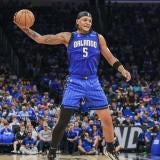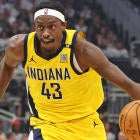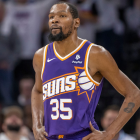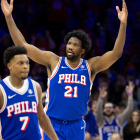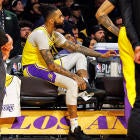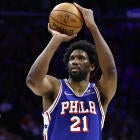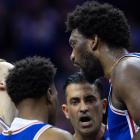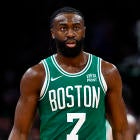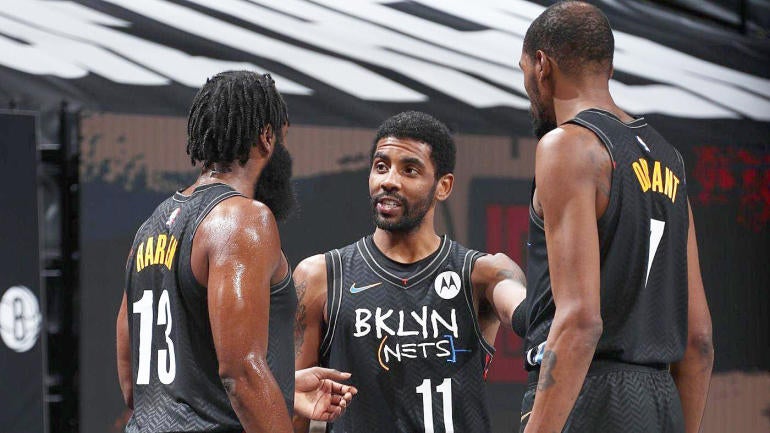
Another contender traveled to Brooklyn to take on the Eastern Conference favorites on Tuesday, and another contender fell against the might of their big three. This time, it was the Los Angeles Clippers attempting to contain the unstoppable Nets, and they failed in a 124-120 defeat at the hands of the NBA's best offensive trio. Kevin Durant, Kyrie Irving and James Harden combined for 90 points in the victory and came back from a 12-point first-half deficit to take the game and move within two of the Philadelphia 76ers for the No. 1 seed in the Eastern Conference.
The Clippers can at least leave New York satisfied that they held their own in the measuring stick contest. The Clippers opened the season with big wins against the Lakers and Nuggets, but have played a weak schedule since then. Now, more than 20 games into the season, they've seen where they stand against one of the teams they might need to beat in order to win the championship. Here is what they, and the Nets, can take away from Tuesday's clash of the titans.
1. Brooklyn's formula
Ignore the hiccups against Washington and Cleveland. Ignore the gaudy opposing point totals, the season-high individual scoring numbers from opponents and the late-game mistakes. Brooklyn has now played three playoff teams since acquiring James Harden, and a formula is beginning to present itself: keep the game in the 120s, not the 140s, get efficient offense from all three stars, and trust that one of them will break out with a 40-point explosion or monster triple-double.
That, in essence, is what happened against the Clippers. Irving led the way with 39 points, but Durant and Harden combined to shoot 64 percent from the field. Brooklyn's defense has actually fared better on a relative-basis against good offenses (ranked 20th against top-10 scoring units since acquiring Harden, per Cleaning the Glass) than it has against mediocre ones (dead last) and bottom-10 opponents (23rd). That suggests that effort, to some extent, can lift the Nets up to competence, and it has against their best opponents.
On paper, this is what the Nets would probably want a Finals game to look like. Their offense, as a whole, is defense-proof. No team is ever going to lock down all three of their stars at once. They don't have to be great on defense. They just have to be good enough to supplement an offense that will give them a chance against any opponent, and it was on Tuesday.
2. Big or small?
When Brooklyn played Milwaukee in its first possible playoff preview of the Harden era, it devoted 38 of a possible 48 minutes to DeAndre Jordan in an effort to deter Giannis Antetokounmpo at the basket. It worked, but Steve Nash has remained adaptable. Jordan played only 16 minutes against the Clippers as Jeff Green got the remaining 32 at center.
In theory, the plan worked. The Nets won the game, and even with Green as their small-ball five, they more than held their own inside. The two teams tied with 44 paint points apiece and Brooklyn won the rebounding battle 44-39. The Clippers aren't a particularly paint-oriented team. The bulk of their shots are jumpers, and switching tends to be the best defense against such offenses. But playing that way allowed Kawhi Leonard to hunt for ideal matchups quite a bit early on. He managed to find Irving and Joe Harris on several early possessions as the Clippers built their first-half lead, and that strategy is going to be a common one Brooklyn should expect against elite offenses in the playoffs.
That's not to say that, on balance, small-ball is a negative. Aside from the spacing benefits, it makes it far easier for the Nets to park Harden in the post defensively, where he is most comfortable and made an enormous impact on Tuesday. But the Nets won Jordan's minutes by six points and lost Green's by two. That's not an enormous difference, but it points to the difficulty of shifting between identities. If the Nets can't master one approach, how will they split the difference against teams that can punish both?
3. Who's ready for primetime?
Every Nets starter played at least 32 minutes in this game. Four Clippers starters did, and Marcus Morris gave them 31 minutes off of the bench. Both teams held on for dear life when their reserves had to play. Not a single Clippers reserve had a positive point-differential. Brooklyn's backups aside from Jordan attempted only five shots.
The Lakers won the championship last season for a variety of reasons, but nailing their minimum-salary signings was one of the biggest. Getting Dwight Howard, Markieff Morris and Rajon Rondo off of the scrap heap allowed them to play through the entire postseason without worrying about devoting minutes to any outright liabilities.
The Clippers are getting closer to that. Nic Batum has been a revelation, and Reggie Jackson is slowly starting to return to his Detroit form. The Nets still have a ways to go. They've allowed Landry Shamet to play through his struggles, but he's still hovering around 30 percent from behind the arc. Timothe Luwawu-Cabarrot has been too inconsistent, and while Bruce Brown's defense is sorely needed, he's shooting less than 20 percent on corner-3's so far this season.
The Nets trust only six players right now. The Clippers run deeper than that, but watching Luke Kennard play only four minutes in such a big game isn't particularly encouraging. Brooklyn has the time and tools to improve its bench. The Clippers can reasonably hope that their answers are internal. But right now, both are relying very heavily on their starters to win games. That can work in the regular season, but champions need role players like Rondo and Howard to step up if they're going to last four rounds.
4. Don't forget who the Clippers were missing
Not to rain on Brooklyn's parade, but this wasn't quite the possible Finals preview we were hoping for largely because of one absence. Irving scored 39 points in this game, but the absence of Patrick Beverley, an All-Defense point guard, likely contributed to that. The Clippers are over 10 points per 100 possessions better with Beverley on the floor (allowing 101.7 points per 100 possessions) than they are with him off of it (111.8).
That isn't to say that Beverley would shut Irving down. Nobody can do that. But rarely do All-Defense selections allow 39 points on 15-of-23 shooting. In a game with such thin margins, Beverley making Irving work a bit harder, or at least giving the Clippers more matchup versatility and limiting Jackson's minutes on the floor, might have made all the difference. Eventually, the Nets are going to run into a team with three high-end perimeter stoppers in the postseason. Boston has three between Marcus Smart, Jaylen Brown and Jayson Tatum. Philadelphia has three between Ben Simmons, Matisse Thybulle and Danny Green. Milwaukee has never proven willing to deploy their best players this way, but Antetokounmpo, Khris Middleton and Jrue Holiday would all pose problems for Brooklyn's stars. We still haven't seen how the Nets would handle such defensive depth. They've had at least one exploitable matchup in all of their games thus far, but that is eventually going to change, and pegging Brooklyn's playoff potential is going to be impossible before we see how they handle that.








